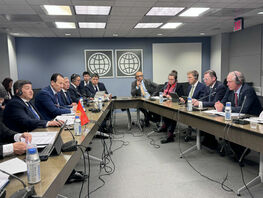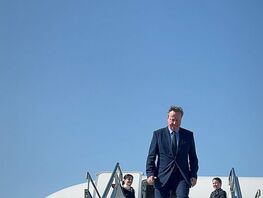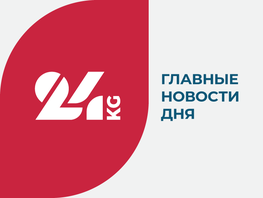Revised and updated Strategic Masterplan for remediation of uranium legacy sites in Central Asia has been signed. Delegation of the European Union to the Kyrgyz Republic reports.
The ceremony was held in Vienna on the sidelines of the 65th session of the General Conference of the International Atomic Energy Agency (IAEA).
The document was signed by representatives of the Kyrgyz Republic, Tajikistan, Uzbekistan, IAEA, European Union (EU), European Bank for Reconstruction and Development (EBRD), as well as Rosatom corporation. The parties reaffirmed their commitment to coordinate work on the rehabilitation of uranium legacy sites in Central Asia.
Today, abandoned mining and processing sites endanger the environment and the health of the local population and impede economic development.
There is a real risk of radioactive pollutants and heavy metals entering into the cross-border river system and causing an ecological disaster.
Led by the European Union, the international community established the Environmental Remediation Account for Central Asia (ERA) in 2015 to address the legacy of Soviet uranium mining in the region. The account and funds are managed by the EBRD as the bank has experience in overseeing nuclear decommissioning projects in a number of countries. The first donors to the account were Belgium, Norway, Lithuania, Switzerland, the United States and the European Union, which allocated €26 million in 2016-2019.
In 2017, with the support of the IAEA, the first Strategic Masterplan was developed and seven priority sites were selected: Min-Kush, Shekaftar and Mailu-Suu in Kyrgyzstan; Yangiabad and Charkesar in Uzbekistan; Istiklol and Digmay in Tajikistan. Funds in the amount of €85 million were required for their full rehabilitation. As funds were received in the fall of 2019, work began in Min-Kush and Shekaftar.
They were carried out ahead of schedule and will be completed by the end of 2021. Work in Mailu-Suu is scheduled to begin in 2022, as well as at facilities in Uzbekistan.
Based on the results of these works and taking into account the updating of financial calculations, with the participation of the IAEA, an updated Masterplan was developed, which was signed by the parties on September 21. According to the new cost estimate, there is still a funding gap of €40 million, which is about half of the required amount. Donor funds are needed to complete the remediation program. The updated Masterplan with all calculations will be published at the end of 2021.





